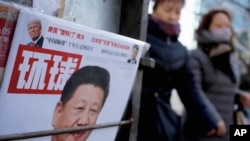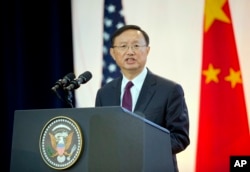U.S. President Donald Trump told Chinese President Xi Jinping in a telephone conversation that the United States intends to honor the "One China" policy by acknowledging China's position that it has sovereignty over self-ruled Taiwan.
The acknowledgement was seen as an important first step toward improving relations between the two countries that had been cast in doubt following a phone conversation Trump had with Taiwan's president after the presidential election in November.
For weeks, uncertainties about the future of the U.S. China relationship have been growing as Tweets from Trump and comments from those in his administration have riled rulers in Beijing.
However, just how long the new found calm may last, is difficult to say, analysts argue.
Extremely cordial
According to a statement from the White House, the two leaders talked about numerous topics during the phone call, which took place early Friday morning Beijing time. The conversation was “extremely cordial” and the two extended invitations to visit their respective countries, the statement added.
What has caught the attention of most, however, was Trump’s mention of the so-called “One China” policy, a decades old position that Beijing regards as the political foundation of the relationship between the two countries.
Under that longstanding policy, Washington acknowledges China’s position that there is only one China and Taiwan is a part of it. Taiwan and China split amid a civil war in 1949 and since then Taipei has gone on to turn itself into a vibrant Asian democracy.
Beijing, however, wants unification for Taiwan (a proposal that is not popular on the island) and has never rejected the possibility that it could use force to achieve that goal.
In December, Trump angered Beijing when he took the unprecedented step of speaking with Taiwan’s President Tsai Ing-wen on the phone. China shuns official contacts with the self-ruled island.
But what irked Beijing even more was the subsequent comment by Trump that the United States did not necessarily need to stick to the “One China” policy.
Our “One China”
Trump's tone during the call was said to be much softer, but how much his position has changed is a matter of debate.
According to the White House statement, “President Trump agreed at the request of President Xi, to honor our “one China” policy.”
Some are already suggesting Trump was backtracking or that he has capitulated to Beijing.
However, Alexander Neill, a Shangri-La Dialogue senior fellow for Asia at the International Institute for Strategic Studies in Singapore, said there could be some other meaning in the way the statement was phrased.
In particular the White House’s use of “our” and not China’s “one China” policy and how it said the statement was made at Xi’s request.
“Just reading the statement it would be apparent that Xi pressed Trump on it, and then he conceded to honor ‘our' one-China policy,” Neill said. “And the semantics or the nuance of that suggests that he is not prepared to have China’s version of the 'one China' policy force fed to him.”
Neill said that it appears that since the fracas with Taiwan’s President Tsai, Trump has been briefed quite carefully on the intricacies by the State Department, national security officials and others. But he also sees the Trump administration boosting ties with Taiwan regardless.
“What I suspect is that Trump may seek to widen the non-official relationship with Taiwan quite considerably,” he said. “To abide by the "one-China" policy doesn't necessarily mean that he is not going to give time to the relationship with Taipei.”
Trying to 'Kissingerize' ties
Trump ran a campaign heavy on tough talk about trade with China and anxiety has been growing in Beijing in recent weeks.
It was not just the phone call to Tsai, but Tweets and comments such as Secretary of State Rex Tillerson’s suggestion during his nomination hearing that Washington could use blockades in the South China Sea that sparked strong rebukes from Beijing.
Trump had pledged to immediately label China a currency manipulator and during his campaign talked about levying heavy import taxes on Chinese imports. Neither of those things have happened yet.
Over the past week, ties have seemed to take a turn for the better. There was a high-level meeting between China’s top diplomat, Yang Jiechi, and Trump’s national security advisor, Michael Flynn, last Friday and an exchange of letters and now a phone call.
The conversation included not only talk about low-level meetings, but possible visits by the two presidents as well.
“On the China front, it is almost like overnight, things have changed a lot. But this is Trump World and things could change overnight, even within the hours,” said Asia analyst Alejandro Reyes.
For now, Reyes said it appears that the White House is ready to put to one side the threats Trump has previously made regarding China.
“So, it looks like that in the White House that there is some attempt to try to Kissingerize the relationship -- that maybe the advice of Henry Kissinger has seeped through,” Reyes said. “In the sense that there is no point in trying to create some kind of tough guy relationship with China where you upset the apple cart and see what happens.”
Backdrop of tension
But while Trump and Xi have finally broken the ice and spoken with one another, it took place against a backdrop of rising tensions in the East and South China Seas, where China has territorial disputes with many of its neighbors, Neill adds.
“Overshadowing all of this is a real dip in military-to-military relations. I think it’s looking pretty dismal at the moment,” Neill said.
On Thursday, a U.S. official told Reuters about what Neill called a “disturbing” close encounter between a Navy P-3 plane and a Chinese military aircraft over the South China Sea.
Japan's scrambling of fighter jets in the East China Sea following Chinese intrusions rose exponentially, he said, noting that they have already surpassed the peak of scrambles during the height of the Cold War.
“It will be interesting to see from Trump’s interactions with (Japanese Prime Minister) Shinzo Abe over the next couple of days, whether or not Abe feels emboldened to take on, or to challenge, Chinese adventurism in the East China Sea,” Neill said.
Abe and Trump hold talks (Friday and Saturday), discussing a range of issues including economic and security relations. The two are also scheduled to golf in Florida.








